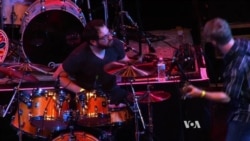LOS ANGELES —
Nick Sherwin of California-based Suburban Skies says his band promotes itself and controls its own destiny thanks to 21st Century technology.
“Social media is a wonderful thing, and being able to control your own art and not be signed by a record label — to be your own record label — is liberating.”
The Internet and social media, he says, have created more opportunities for musicians, and the key to success is giving fans a multifaceted experience.
While having content — songs, videos — is critical, "I think it is extremely important to do shows to build your brand, to build your reputation,” he said.
At the Milken Institute Global Conference in Los Angeles this past April, music industry executives discussed the future of the business. With the decline in U.S. CD sales, they said, musicians are hitting the stage.
“The majority of the income for artists now is coming from the live marketplace,” said Rob Light, head of music at Creative Artists Agency, a Hollywood-based talent agency.
Along with the popularity of live music there has been an explosion of music festivals, including events that feature electronic dance music — again, all with the help of social media.
“Someone could make it in their bedroom and put it out there," said Pasquale Rotella of Insomniac, a company that produces electronic dance music festivals in several countries.
"People can gain fans that way, online without anyone’s help, and that has absolutely helped the growth of dance music.”
But according to Bob Pittman, the head of Clear Channel Communications, while fans get music through digital downloads and online streaming services, they are still tuning in to the radio.
“In this era of streaming services, radio listeners have increased," he said. "And if you look at the research, 70 percent of Americans, 'where did you discover the music you buy in your music collection?' 70 percent say FM radio.”
But Rob Light of Creative Artists Agency says radio will become obsolete.
“I do not believe that terrestrial radio is going to be as relevant to a 12-year-old today in five or six years, and if you are going to look forward, I think they are going to get information from other places and other sources," he said.
But with what seem like limitless places for people to discover new music, Nick Sherwin of Suburban Skies isn't worried. He just wants to reach those who like his style of music with the help of the Internet.
“Social media is a wonderful thing, and being able to control your own art and not be signed by a record label — to be your own record label — is liberating.”
The Internet and social media, he says, have created more opportunities for musicians, and the key to success is giving fans a multifaceted experience.
While having content — songs, videos — is critical, "I think it is extremely important to do shows to build your brand, to build your reputation,” he said.
At the Milken Institute Global Conference in Los Angeles this past April, music industry executives discussed the future of the business. With the decline in U.S. CD sales, they said, musicians are hitting the stage.
“The majority of the income for artists now is coming from the live marketplace,” said Rob Light, head of music at Creative Artists Agency, a Hollywood-based talent agency.
Along with the popularity of live music there has been an explosion of music festivals, including events that feature electronic dance music — again, all with the help of social media.
“Someone could make it in their bedroom and put it out there," said Pasquale Rotella of Insomniac, a company that produces electronic dance music festivals in several countries.
"People can gain fans that way, online without anyone’s help, and that has absolutely helped the growth of dance music.”
But according to Bob Pittman, the head of Clear Channel Communications, while fans get music through digital downloads and online streaming services, they are still tuning in to the radio.
“In this era of streaming services, radio listeners have increased," he said. "And if you look at the research, 70 percent of Americans, 'where did you discover the music you buy in your music collection?' 70 percent say FM radio.”
But Rob Light of Creative Artists Agency says radio will become obsolete.
“I do not believe that terrestrial radio is going to be as relevant to a 12-year-old today in five or six years, and if you are going to look forward, I think they are going to get information from other places and other sources," he said.
But with what seem like limitless places for people to discover new music, Nick Sherwin of Suburban Skies isn't worried. He just wants to reach those who like his style of music with the help of the Internet.





